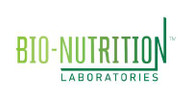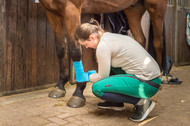Why You Need an Equine First Aid Kit and How to Assemble One
Posted by Bio-Nutrition Laboratories on Aug 28th 2018
As every horse owner knows, horses are very prone to accidents. From sprains to scratches or puncture wounds, horses are magnets for injury. This is especially true on the weekends when you are away from home, and away from your veterinarian. Smart horse owners know the benefits of a well-stocked, easily accessible first aid kit. These items will help you dress wounds, reduce pain and inflammation and more.
A first aid kit packed with healthcare essentials can save you a load of stress and headaches, whether you are on the road or unable to have your veterinarian come over to the barn right away. Below are some of the essentials you need to create your own equine first aid kit. Since a horse injury can happen anywhere, we recommend you store your first aid kit in a secure box or zippered case handy in your barn, truck or travel trailer and saddle bag.
Pro tip: A fish tackle box or large plastic makeup trunk works well to store these items. When on the road, a fanny pack or backpack is a convenient way to carry first aid essentials.
First Aid Checklist
- Bandage Material – Gauze pads, VetRap, Waterproof Tape
- Ointments – Antibiotic cream, Wound ointment
- Gloves
- Standing Bandages
- Epsom Salt Poultice
- Thermometer
- Alcohol Prep Pads
- Bandage Scissors
- Suture Scissors
- Sterile Saline
- Chlorhexidine Solution
- Providone 10%
- Blood Stop Powder
- Cotton Roll
- Bio-Nutrition Labs AspirEase Gel or ApirEase Granules
- Bio-Nutrition Labs PediaSorb
- Horse Clipper
- Swiss Army Knife
- Eye Wash
- Ophthalmic Gel
- Activated Clay Gel
Medicines / Supplements
- AiraCell (Iron, B-Complex)
- B12 Injectable / High Level B Complex
- Magnalax
- Banamine (Rx Only)
- Dexamethasone (Rx Only)
- Lidocaine (Rx Only)
- Diphenhydramine (Benadryl)
"If there's an accident waiting to happen, a horse will find it."
Keep these items in your barn, horse trailer and on the road when you travel with your horse, and you will be able to treat your horse quickly when accidents occur. It is also important to keep a complete record of your horse’s health history, medications, vaccinations, and wormers handy in the case of an emergency. Horse Illustrated offers a great FREE Horse Health Record Sheet available for download here.
For your trailer medicine bag, here's what the Bio-Nutrition Labs team keeps on hand:
Gloves, Thermometer, Needles, Syringes, Alcohol, Roll Gauze, VetRap, Waterproof Tape, Dust On, Bandage Scissors, Suture Material, Suture Scissors, Staple Gun, Wire Cutters, Needle Nose Pliers, Staple Remover, Chlorhexidine Solution, B12, Electrolyte Paste, Banamine/Bute, Dexamethasone (Rx), Lidocaine (Rx), Diphenhydramine Tablets, Hoof Pick, Horse Clipper, Bio-Nutrition Labs AspirEase Gel & AspirEase Granules, Blood Stop Powder, Cotton Roll, Wound & Skin Gel, Eye Wash, Ophthalmic Gel, Immediate Response, Bio-Nutrition Labs PediaSorb.
The key with first aid is to act quickly and carefully but remember, a first aid kit is a great tool for minor injuries. You should not expect it to cover serious health problems. For major health issues, keep your veterinarian and farrier’s contact information in an easy-to-access location so that you can contact them right away, if needed.
What are your first aid essentials? Tell us on Facebook and Instagram by tagging @BioNutritionLabs with hashtag #EquineEssentials.


